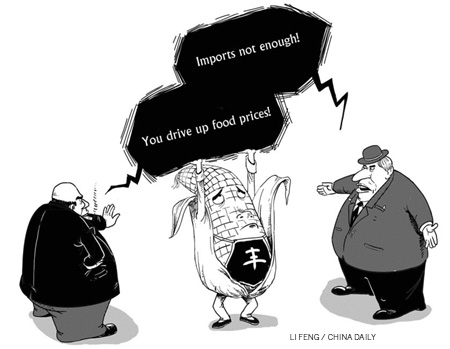View
Nation at food security crossroads
By Fan Shenggen (China Daily)
Updated: 2010-09-09 08:02
 |
Large Medium Small |

Efforts to ensure food security in China have so far been successful. The country has experienced more than three decades of sustained agricultural growth and significant reduction in hunger. Gradual agriculture-led reform in the late 1970s and technological breakthroughs, such as the development of hybrid rice, have led to large increases in agricultural output.
Although the importance of agriculture in the overall economy has declined in the past three decades, it has not been accompanied by a decrease in domestic food self-sufficiency. The country now accounts for about 20 percent of global grain production and less than 3 percent of the global grain imports.
But many in the international community have questioned the sustainability of China's self-sufficiency in food. Popular opinions suggest that China's growing food consumption cannot be met by domestic food supply. Some people have expressed fears that the increase in demand will lead to increased imports, higher prices, global food shortage and even hunger.
Rising incomes, urbanization and changing consumer preferences have increased the demand for high-value products, including meat, fish, fruits and vegetables, as well as animal feed. But the fears of a global food shortage are unfounded. There are other complex factors such as high oil prices, increased biofuel production and export restrictions to protect food supplies that have been driving up food prices in recent years.
China is actually caught between two sets of criticisms. On one hand, it is accused of not importing enough agricultural products to balance its foreign trade. On the other, it is blamed for driving up food prices by importing more. Triggers, such as an increase in China's agricultural imports, tend to revive critical opinions. And its unexpectedly large imports of corn and soybeans in recent months have renewed some people's fears of rising global prices.
Since China accounts for a very small share of global grain imports, it hardly plays any role in shaping the global grain market. But its influence could be greater in other agricultural commodities' markets, such as oil crops that it imports more. China's oil crop imports account for about 50 percent of the global total, a sufficiently large share to drive up global prices. But China is unlikely to become a significant importer of grains in the coming years, and it will continue to meet its rising food demand largely from its domestic agricultural production.
Although its agricultural output faces some weather-related fluctuations now, its domestic food supplies are secure. Recent floods and landslides have led to crop loss, but these localized incidents will not reduce its total agricultural output significantly. Their impact on agricultural prices is not expected to be large either, because of the government's existing price stabilizing regulations.
Moreover, it can meet its crop deficits by releasing some stocks from the national grain reserves, which remain very high.
Natural resource constraints and climate change will put additional pressure on the country's agriculture in the long run. Water scarcity, land degradation and extreme weather are increasingly threatening its sustainable agricultural production.
But agriculture offers great opportunities for adaptation to climate change and mitigation strategies, too. While China has taken big strides in addressing climate change, it should increase its investment in research and development (R&D), as well as irrigation and water-saving technologies. And given the large regional differences in the impact of climate change, mitigation and adaptation policies should be customized to local conditions.
China still has room to increase its food production to ensure national and global food security. Policymakers should build on their past efforts, which are laudable, to increase agricultural productivity with new policies and investments in R&D and modern technology.
To sustain high levels of agricultural growth, smallholders should be given incentives such as secure land rights. China's success in agriculture-led broad-based development and its growing role in the global economy have important ramifications for other developing countries, too.
Hence, it should provide agricultural aid and know how to such countries to help them become food secure and strike mutually beneficial partnerships with them. This will help it ensure national and global food security.
The author is director general of International Food Policy Research Institute, based in Washington D.C.